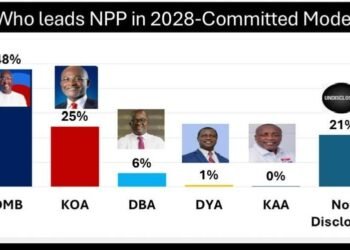Ghana’s battle against financial crime has been thrust back into the spotlight after a contentious court ruling involving Michael Nyinaku, the former CEO of the collapsed Beige Bank, stirred widespread public debate across the country.
Legal scholar and Democracy and Development Fellow at the Centre for Democratic Development (CDD-Ghana), Prof. Stephen Kwaku Asare, reacted strongly to the Court of Appeal’s decision to acquit and discharge Mr. Nyinaku on all 44 criminal charges brought against him.
According to Prof. Asare, the acquittal marks a pivotal moment in the country’s ongoing struggle to hold financial institutions and their leaders accountable.
He argued that the verdict should not be used to justify weakened prosecution efforts or a shift toward settling complex cases for limited gains.
“That half a loaf is better than none mindset may suffice in politics or diplomacy. But trading cash for accountability has no legitimate place in the criminal justice system.
“Solomon’s wisdom in the baby-splitting parable reminds us that some matters cannot be resolved through compromise. Criminal justice, like the baby, cannot be halved without being destroyed.”
Prof. Stephen Kwaku Asare
Meanwhile, Nyinaku had faced multiple charges, including stealing, fraudulent breach of trust, and money laundering, following the 2018 collapse of Beige Bank.
A forensic audit conducted by the Receiver alleged that billions in depositor funds were diverted through various illicit schemes.

These included the transfer of ₵448.6 million in fixed deposits to Beige Capital Asset Management, a firm owned by Nyinaku, as well as the creation of a fictitious account used to shift ₵320 million, and additional transfers to individuals and businesses linked to him.
Despite the magnitude of these allegations, the Court of Appeal dismissed the case on July 25, 2025. This development has reignited debate over whether the state should pursue full convictions or accept partial outcomes through plea deals or settlements.
While some argue that a partial win is better than nothing, Prof. Asare believes that accepting reduced penalties in high-stakes financial crime cases threatens the integrity of the justice system.
No Compromise In Justice In Nyinaku Case
Prof. Kwaku Asare further asserted that accountability must be whole—not negotiated, not reduced, and certainly not compromised in exchange for cash.
According to the legal scholar, the real takeaway from the Nyinaku ruling should be a call to reform, not retreat. He stressed that the verdict might not be an outright rejection of the facts but rather the result of procedural flaws, evidentiary weaknesses, or missteps in charge formulation.
Without the Court’s written opinion, the public risks interpreting the decision as a vindication rather than a technical acquittal. Prof. Asare believes such assumptions could distort public understanding and weaken resolve in the fight against financial crime.

“The Real Lesson Might be to Improve Financial Crime Prosecution: This moment calls not for retreat, but introspection and reform.
“Complex financial crimes require: Thorough forensic investigations; Strategic charge framing and sequencing; Expert witnesses who can explain intricate transactions clearly; Close collaboration between investigators, prosecutors, regulators, and auditors.”
Prof. Stephen Kwaku Asare
Prof. Asare also warned that plea bargains must not be reduced to mere tools of expediency.
He asserted that any such deals must include explicit admissions of guilt, be transparent to the public, reflect the seriousness of the offense, and serve a broader investigative purpose.
He emphasized that the courtroom is not a marketplace for bargaining away justice. Instead, plea deals should be used strategically—to unlock testimony, secure cooperation, and build stronger cases—not to shield powerful individuals from full legal consequences.
Civil Recovery Can’t Replace Prosecution
Another key point raised by Prof. Kwaku Asare is the risk of over-relying on civil recovery mechanisms at the expense of criminal prosecutions.
While civil asset forfeiture can play a crucial role in reclaiming misappropriated funds—especially given its lower evidentiary threshold—it should complement, not replace, criminal proceedings.
He maintained that Ghana needs a dual-track system: civil litigation for the recovery of stolen assets and criminal trials to ensure accountability, deterrence, and justice.
Allowing individuals to simply refund money and avoid prosecution would create a dangerous precedent, one that undermines deterrence and invites further abuse.

Backing away from prosecuting financial crime, he warned, only emboldens future offenders. It sends a message that the system punishes only the weak and allows the powerful to negotiate their way out.
This weakens public trust, discourages whistleblowers, and fractures confidence in state institutions.
“Yes, prosecuting financial crime is difficult. But so is nation-building. The Nyinaku acquittal must be studied, not sensationalized. Once the judgment is released, its insights should feed into prosecutorial training, legal reforms, and institutional recalibration.”
Prof. Stephen Kwaku Asare
Accordingly, he called for specific measures moving forward: time-bound trials for financial offenses, enhanced capacity in forensic and evidentiary procedures, better use of both civil and criminal remedies, and updated laws to streamline asset forfeiture.
In closing, Prof. Asare warned that the cost of impunity far exceeds the cost of a failed trial.
Ghana’s goal, he emphasized, should be full justice, not partial settlements or hollow victories.
“Justice is not measured by conviction rates alone. It is measured by diligence, courage, and integrity, especially when the stakes are high.”
Prof. Stephen Kwaku Asare
READ ALSO: President Mahama Pays Tribute to Daddy Lumba























